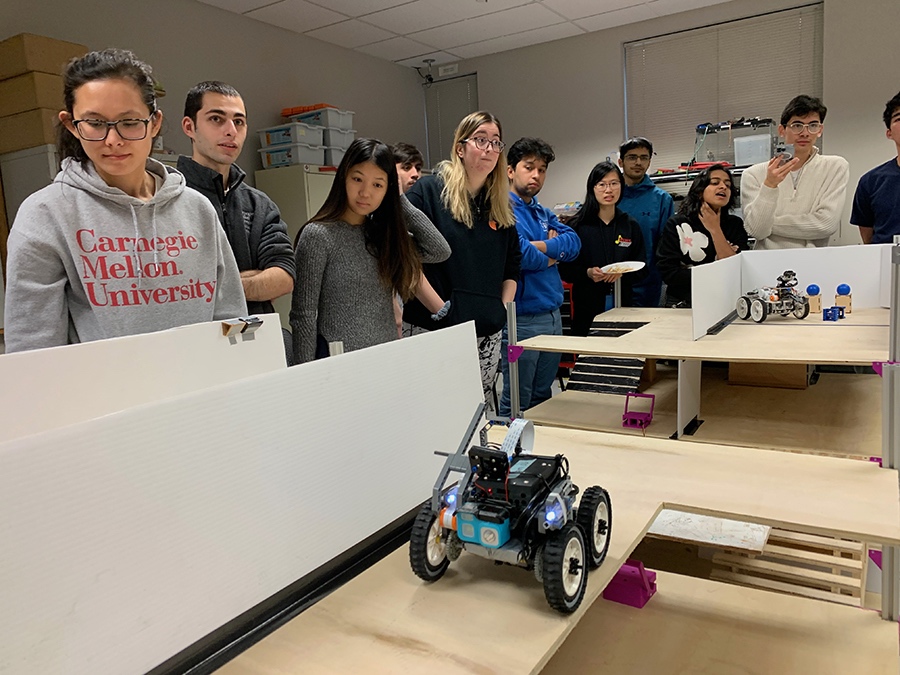Starting this fall, undergrads in Carnegie Mellon University’s School of Computer Science (SCS) can can claim robotics as their major.
Surprised the school so known for its robotics prowess didn’t already offer this bachelor of science degree? SCS has housed related courses for years, and its Robotics Institute, founded in 1979, is a hub for research as well as master’s and doctoral degrees in the field.
But there’s intention behind the delay in launching this BS program, which may be one of only a handful in the country.
“Part of the reason that we waited until now to introduce this degree is because we were waiting for the jobs to become available,” professor George Kantor told Technical.ly. Kantor is co-director of the new bachelor of science program as well as associate director of education at the Robotics Institute.
Whereas the industry may have once exclusively hired those with advanced degrees, Big Tech companies such as Amazon and Apple are increasingly hiring entry-level talent for their robotics departments, and Pittsburgh has its own huge share of robotics startups in need of talent, he said. That means it’s just as feasible that once they graduate, students nowadays could either seek employment immediately or choose to pursue a graduate degree.
Robotics undergrads at SCS will take core computer science courses, plus a “RoboMath” class and new courses such as robotic building, planning and control.

George Kantor. (Photo courtesy of Carnegie Mellon University)
Most other robotics undergraduate degree programs live within universities’ engineering schools, Kantor said. The benefit of CMU’s program being based at its computer science school is that students will graduate with a degree from SCS, which holds a certain weight in the professional world. But the hope is also that they’ll develop unique skills by applying this lens.
“The other thing is, Carnegie Mellon’s take on robotics has always been a very computer science-centric take — so, we think of robotics as the embodiment of artificial intelligence, we spend a lot of time thinking about the algorithms and the sensor processing methods, and the autonomous decision making that you have to do to make a robot work,” he said. “We intend this program to be very cross-disciplinary. Students will get some mechanical engineering skills and some electrical engineering skills, but the focus will be computer science.”
SCS aims to maintain relationships with all local robotics companies, and its leaders will be “working hard” to connect students to them for jobs, said Kantor, who is also cofounder of robotics-driven agtech startup Bloomfield Robotics.
“Robots can change the world, and the new Bachelor of Science in Robotics gives current and incoming SCS students a pathway into this exciting industry,” Robotics Institute Director Matthew Johnson-Roberson said in a written statement. “We are filling a demand for more robotics-focused courses and for more well-rounded, diverse, highly trained roboticists.”
One part of the field students are especially excited about, according to Kantor? Autonomous vehicles, for which Pittsburgh is a hotbed. (Plus: Lucky for them, the latest entrant to the Pittsburgh tech scene, Stack AV, just launched with a slew of open roles.)
SCS leaders expect to enroll 10 students in this program this semester, then 25 each following year. Find more information about the new academic program or apply on the Robotics Institute’s website.
P.S. Also new from CMU: online certificate graduate programs in AI engineering fundamentals, 3D bioprinting and computational data science.
Before you go...
Please consider supporting Technical.ly to keep our independent journalism strong. Unlike most business-focused media outlets, we don’t have a paywall. Instead, we count on your personal and organizational support.
Join our growing Slack community
Join 5,000 tech professionals and entrepreneurs in our community Slack today!

The person charged in the UnitedHealthcare CEO shooting had a ton of tech connections

From rejection to innovation: How I built a tool to beat AI hiring algorithms at their own game

Where are the country’s most vibrant tech and startup communities?



